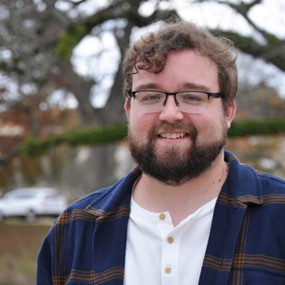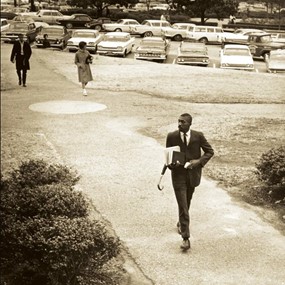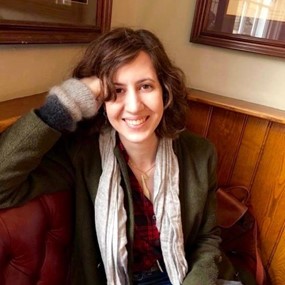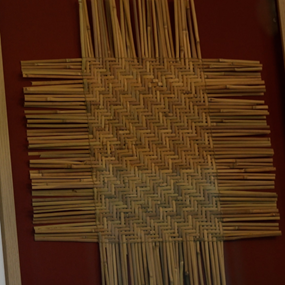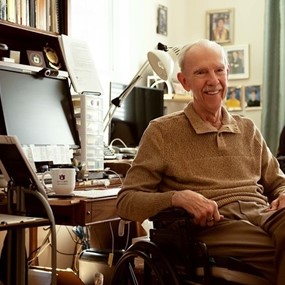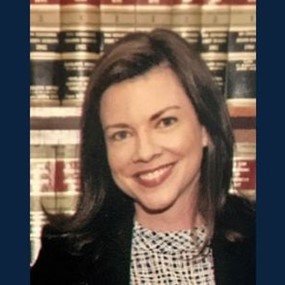Alumni Spotlight: Jerald Crook, ’12, Program Coordinator at Georgia Humanities
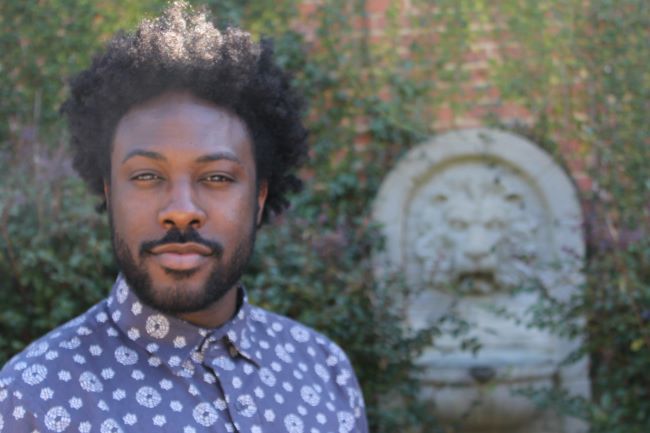
A self-described passionate Earth Citizen, Jerald Crook, who graduated in 2012 with a bachelor’s degree in history, is the new program coordinator at Georgia Humanities where he is responsible for managing the organization's communications and facilitating the organization's grants program.
“Twice a year, through a competitive process, we award grants to such cultural, civic, and educational entities as museums, libraries, universities, and historical societies for a range of projects, including walking tours, exhibitions, author talks, lecture series, and literary festivals,” Crook said about his new position.
Previously, Crook worked as the programs coordinator for the Alabama Humanities Alliance for almost three years. And before that, Crook was the community relations specialist at the Alabama Bicentennial Commission, where he served as the primary liaison to the local state and committees looking to plan events and projects to commemorate the 200th anniversary of Alabama’s statehood.
Born and raised in Bay Minette, Alabama, Crook’s love for the humanities began at an early age.
“Despite growing up in a rural environment, my childhood consisted of museum visits, concerts of various music genres, theatre and dance shows, and events that exposed me to various cultures. With this instilled in me, I came to deeply value experiences that allowed me to explore human condition and expression. The arts and humanities are, without a doubt, one of the best vehicles for that exploration, and so I work now to advocate and make sure that others are able to plug into that experience,” Crook said.
In 2014, Crook formally created Higher Ground Society (then known as "Young Man Visions, Old Man Dreams") to curate cultural programming that would bring small communities together both for entertainment and conversation that draws community members closer to each other. In the six years of HGS's existence, they have hosted poetry readings and film screenings, established a podcast, and are currently facilitating the recording of a compilation album featuring Alabama artists.
This love and appreciation of the arts and humanities was briefly overshadowed by a completely different fascination – architecture.
“As a high school junior or senior, I noticed I really enjoyed observing buildings and imagining how their design and structure came to be. At the time, I was very passionate and excited about becoming an architect and set out to bring the dream to life,” Crook recalled. “Despite my love and admiration for the architectural discipline, I soon realized that it wasn’t exactly the right path for me at the time.”
Through a path of discovery at Auburn, Crook reconnected to his earlier love of the humanities and pursued a degree in history. He also uncovered a passion for being a good citizen of the planet and pursued a minor in sustainability.
Learn more about Crook’s path, passions and Auburn experiences in our interview, below:
Would you please tell us about yourself?
I was raised in Bay Minette, Alabama, where I graduated from Baldwin County High School in 2008. In the fall of the same year, I began my higher education journey by attending Auburn. After four incredible years on The Plains, I graduated cum laude with a bachelor’s degree in history and a minor in sustainability. The minor was a relatively new program offered at the time. The goal after graduation was to work as an archivist or public historian, but quickly evolved into working in the nonprofit sector. After six years of working in city and state government and higher education, I reentered the classroom and obtained a Master of Public Administration with a focus in nonprofit management from the University of North Carolina-Chapel Hill in 2019.
How did you choose to attend Auburn?
As a high school junior or senior, I noticed that I really enjoyed observing buildings and imagining how their design and structure came to be. At the time, I was very passionate and excited about becoming an architect and set out to bring the dream to life. To that end, I did my research and found that Auburn had the best architecture program in Alabama, and one of the top ranked programs in the nation. At that point, Auburn became the only college I applied to, with the exception of UAB where I applied at the urging of my brother, as it is his alma mater.
How did you choose history as your major?
Despite my love and admiration for the architectural discipline, I soon realized it wasn’t exactly the right path for me at the time. I then tried broadcast journalism as a major. My next stop was the Social Sciences Secondary Education program. My goal in this program was to join the ranks of history educators who were helping young minds understand humanity’s past with the hope of forging a better future. While taking more history courses for this program, my focus shifted more into historical research, and I changed my major to history, accordingly. I finished the program with my thesis research paper “Ev’ry Round Goes Higher: How Black Religious Music Got a New Groove.”
What was your Auburn experience like as a student?
My experience at Auburn was, in a way, quite charmed. It was shaped in large part by my involvement with Auburn’s music department. I marched trumpet in the Auburn University Marching Band all four of my years on campus. I also played trumpet in the AU Basketball Pep Band, and taught myself how to play oboe, with the guidance of the band program’s graduate teaching assistants, in the Campus Band ensemble. During this time, I became a brother of Kappa Kappa Psi, the National Honorary Band Fraternity. I was also a member of the Auburn University Gospel Choir where I thoroughly enjoyed sharing a treasured part of my Black culture with the campus and surrounding communities. Being a part of these campus groups truly changed my life, affording me the opportunity to travel, earn a 2010 football championship ring, and forge friendships that will last a lifetime (I’m having a virtual/socially-distanced St. Patrick’s Day dinner with friends made in the AUMB over ten years ago).
In addition to being involved with Auburn music, I also served as an Auburn University Student Recruiter during my junior year (2010-2011) and the Auburn University Real Food Challenge, which sought to bring healthy, sustainable food options to Auburn’s campus.
My favorite course was the history class “The Civil Rights Movement” taught by Dr. David Carter. I will never forget Dr. Carter’s passion for the course, which made the content come alive and connect to current civil and human rights struggles in such an impactful way. Dr. Carter remains an engaged mentor and friend of mine to this day.
What was your career path after graduation from Auburn?
After graduating from Auburn, I began working at Auburn’s public library and the Alabama Department of Archives and History. I then returned to Auburn’s campus working as student supervisor at the Library of Architecture, Design, and Construction (I worked there as a student as well). My foray into nonprofit work began when I started working for the Alabama Bicentennial Commission in 2017. This led to my eventual work at the Alabama Humanities Foundation (now Alliance) as the state coordinator for National History Day in Alabama. This month (March 2021), I began working for the Georgia Humanities Council as the communications and grants manager.
How did you become involved in the humanities, and why are they important to you?
I became involved with the humanities (and arts) at an early age through the careful grooming of my parents, aunts, and uncles who saw fit to expose me and my siblings to activities that would enrich and develop our cultural capital. Despite growing up in a rural environment, my childhood consisted of museum visits, concerts of various music genres, theatre and dance shows, and events that exposed me to various cultures. With this instilled in me, I came to deeply value experiences that allowed me to explore human condition and expression. The arts and humanities are, without a doubt, one of the best vehicles for that exploration, and so I work now to advocate and make sure that others are able to plug into that experience.
What advice do you have for current college students?
My advice to current college students is to recognize that college is a time to begin acquiring knowledge in three areas:
1) The obvious, in academics—take studies seriously. Learn as much as you can in this formal learning setting. Life gets busy after college so seize the opportunity to focus on soaking up as much information as possible, including topics outside your major.
2) In life—take this opportunity being away from home to genuinely learn about the world and the people around you. It’s easy to fall into a routine similar to one at home, but don’t do it! Be intentional about learning from people and cultures that are different from your own. When these opportunities don’t present themselves, create your own opportunity. Your university should be there to assist you in this way.
3) In mental health—college can be tough, so use this time to develop healthy practices that will help you in the future. Go to therapy (to help process your thoughts and feelings). Set healthy personal boundaries. Be kind to yourself, love yourself...and flourish!
What do you like to do in your free time?
I run my own nonprofit organization, Higher Ground Society, which seeks to build community and understanding through engagement in the arts and humanities. Some of our leading ongoing programs are “patchwork symphony,” a multi-genre album recording project, Chat for Change, an online virtual discussion series, and the Higher Ground Society Podcast where I have conversations with Alabama creatives and humanities scholars. Although I am now a Georgia resident, Alabama is my home and will always have a place in my heart. As such, HGS was created to serve Alabama communities, and always will. Follow us on Facebook, Instagram, and Twitter for updates and engagement opportunities.
Tags: Arts and Culture Alumni History Interdisciplinary Programs

